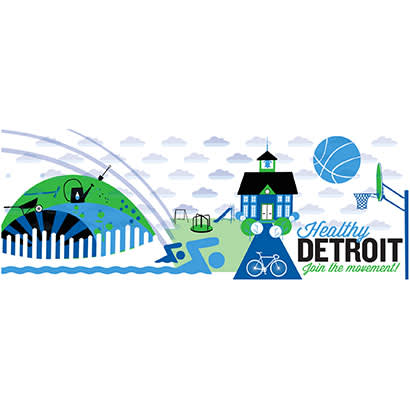
As Nicholas Mukhtar was finishing his medical degree in Detroit, he began to see a different side of healthcare. Rather than follow the career path of a surgeon, focusing on treating people once they became sick, he decided he’d create systems change at the community level and focus on prevention. This shift in focus came as he read through the Affordable Care Act (ACA). Commissioned under the ACA was the U.S. Surgeon General’s National Prevention Strategy (NPS), designed to provide advice on choosing the most effective and achievable means for improving health and well-being.
In response to this strategy, Mukhtar founded Healthy Detroit, a 501(c)(3) public health organization, dedicated to building a culture of healthy, active living in the city of Detroit by providing community members with the education, resources and empowerment needed to live healthy and happy lives.
Mukhtar found, through his research, that only 10–20 percent of a person’s health is related to quality of services received. In comparison, more than 40 percent of the factors that contribute to the length and quality of a person’s life are social and economic, another 30 percent are health-related behaviors directly shaped by socioeconomic factors and an additional 10 percent are related to the physical environment.
Addressing Detroit’s Health Disparities
Healthy Detroit began to address Detroit’s disparities by partnering with several city organizations on various initiatives to achieve health equity in the community. Through its work, primarily with the Detroit Parks & Recreation Department (DPRD), Healthy Detroit is able to increase its reach in the effort to build a culture of primary prevention in the city. Other Healthy Detroit partners include Trinity Health, Holy Cross systems, Mercy Primary Care Center, Ascension Health, Detroit Medical Center and more, who provide the organization with financial support as well as with on-site services — health screenings, support groups and classes; outdoor/indoor fitness equipment and programming, athletic leagues and youth camps; healthy eating/nutrition classes and programs; and resources for employment, transportation, finances and housing — in districts across the city.
In all communities, the overall role of public-private partnerships is developed by connecting several smaller goals. During the 2017 NRPA Annual Conference session, titled “Public-Private Park Partnerships to Achieve Healthy Equity,” Mukhtar outlined what a successful public-private partnership looks like with regard to private entities and local government working to achieve health equity:
- Provide a mechanism for private funders to make substantial investments in long-lasting health initiatives.
- Develop and lead innovative public health initiatives.
- Provide a tool for city government.
- Enable the private sector to become strategic partners of city government.
- Provide a template for more effective community-based interventions.
- Create an effective “social movement” around building a culture of prevention.
While the benefits of creating a public-private partnership are plentiful, the path to get there can be challenging. For Mukhtar, some of the challenges he’s faced include:
- Finding the balance and having the ability to share control.
- Ensuring that the mission, vision and values of the entities align.
- Building a sustainable system.
- Measuring the added value that the partnership provides.
- Maintaining an element of neutrality within the public health system.
“It is important to stress that successful partnerships must have mutual benefits for all parties, and these benefits must be explicit and transparent. Partnerships that are formed in which one side benefits and the other side does not are not sustainable and will not be successful,” Mukhtar emphasizes.
Aligning Healthy Detroit and the DPRD
In its quest to improve health equity, Healthy Detroit implemented a model called HealthPark. HealthParks use existing park space to provide residents with neighborhood wellness hubs, creating a space where community health workers support everything needed to live healthy lives. In partnership with the DPRD and Holy Cross Services, Healthy Detroit designated five HealthPark sites that provide ongoing programming and resources to help residents with issues relating to health, as well as to transportation, housing, finance and employment — barriers often cited to achieving health equity with underserved communities.
As residents enter a HealthPark wellness center, they are assessed by the health workers on both a biometric scale, as well as on a health and social service scale. An eScript is generated, based on that assessment, and then residents are connected to community partners and services in an on-site virtual network that’s ready to address their needs. Residents are also provided with a Healthy Detroit Passport, which collects data through an electronic program and rewards residents with incentives for engaging in programs and services. This passport serves as a tool that not only allows for the collection of important aggregate data, but also engages and empowers residents as they work to achieve their health goals.
Although there are tangible components of HealthParks, Mukhtar believes these spaces also encourage social interaction, community building and civic engagement, yielding important physical and mental health benefits.
Note: For agencies looking to form a public-private partnership to support their community, check out NRPA’s blog, “Simple Solutions to Common Park and Recreation Problems.”
Maureen Acquino is an NRPA Program Specialist on the Health and Wellness Team.

